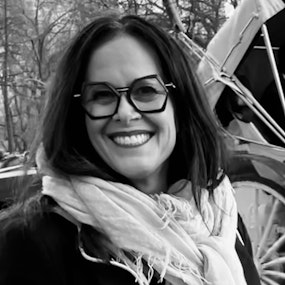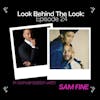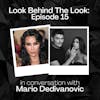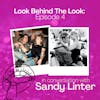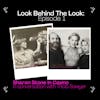
S4 | Ep. 12: Pay Equity Now! - find out what costume designers are fighting for with Danielle Launzel

Our latest podcast episode reveals the critical Pay Equity Now campaign led by the Costume Designers Guild. Discover how costume designers are fighting for fair wages and why their work is pivotal to the entertainment industry. This eye-opening conversation with Danielle Launzel sheds light on the intersection of creativity, gender, and labor rights. Tune in and learn how you can support pay equity efforts!
Pay Equity Now Website
The costume designers guild is fighting for pay parity with their male counterparts
>> Tiffany Bartok: Welcome to look behind the look, the celebrated podcast that explores your favorite looks in film, television, and fashion history through conversations with the fashion world's elite and award winning hair, makeup, and costume designers on sets around the world, you will see and hear exciting tales from behind the scenes, career origin stories, and tons of advice and tips. I'm your host, Tiffany Bartok. Hey, everybody. Welcome to look behind the look. This week we are going to take a look, actually, at an issue. Negotiations are up for Ayatzi right now, and there's a movement that's happening. You're going to see it in your feed. It's pay equity now. And you also might see the hashtag naked without us. so what these are referencing is the costume Designers guild, local eight nine two. They've officially launched their pay equity campaign, pay equity. Now it's vying for parity with their male dominated craft counterparts. And the guild, which is made up of 87% women, is at the lowest tier of the IATSE pay scale, and that includes cinematographers, grips, and production designers. Not only is the disparity clear when looking at the current scale, but the discrepancy has continued to increase by 3% each year. And so that's a trend that we have to put a stop to for future generation of women. That's a lot. So I'm here with Danielle Launzel, who's going to explain all of this to us, the movement, how we can help. And so take a listen and then head to the links in the show notes to learn how you can support the effort. Thanks so much.
The costume designers guild in LA is fighting for pay equity ahead of negotiations
>> Tiffany Bartok: Hi, danielle.
>> Speaker C: How are you?
>> Tiffany Bartok: Thank you so much for meeting with me today and talking about what you're working on. let's just start from the beginning. Can you explain to me what you are fighting for and where you are from? and we'll find out how we can help through our conversation.
>> Speaker C: Great. Thanks for having me.
>> Tiffany Bartok: Of course.
>> Speaker C: I'm a costume designer, and I'm part of local eight nine two, which is the costume designers guild in LA. And one of the issues that I became aware of a couple of years ago, there was a campaign for pay equity. They started with the hashtag naked without us.
>> Tiffany Bartok: I saw that.
>> Speaker C: Yeah, it was a great hashtag.
>> Tiffany Bartok: Yes.
>> Speaker C: essentially, costume designers are 87% female in the costume designers guild, as opposed to, I think, 84% male in something like, the art directors guild, which is production. And so, the difference in pay scale for that is just huge. So we're focusing on the fact that we're pink collar work. and that essentially means we're paid a little bit less, and it's something that we're fighting for. We're trying to, gear up a campaign as we go into the negotiations, or we've been gearing up a campaign as we go into the negotiations, because in, like, a week, we're done. We can't talk anymore. We go to a media blackout, and we can no longer kind of push the agenda while they're in negotiations, which could last through July. And if they end up striking, it would last longer.
>> Tiffany Bartok: Wow. I did not know about the media blackout. Can you tell me more about that?
>> Speaker C: I don't know much about it, but the one thing I do want to explain is that the costume designers guild is part of collective bargaining for the advocacy. And so we don't negotiate by ourselves. We negotiate with these other locals that need to kind of, Everybody has to get what they want, right? I think there's a ton of proposals that are out there and just means that everybody is fighting for something different. There are other guilds or other unions that are fighting for pay equity for female dominant roles, and so we're kind of working in tandem with them and just trying to up the scale rates, because our pensions, our IAP, all of that is based on the scale rates. So when we retire, which I'm getting closer to that age, so I'm very, aware of it, and it's kind of in my face, I will earn less per month than a lot of these people.
>> Tiffany Bartok: Right.
>> Speaker C: In a week.
>> Tiffany Bartok: So you have a growing concern as you're getting closer to retirement, as many of us are, and so you'll be getting in your pension less than many other people will be, according to this model. So you want to fix that before that day comes? Probably.
>> Speaker C: Well, for me, it's probably too late, but for the generation I see, finally, it's based on how much you earn over the course of your career, obviously. And so I've been earning, up to about 35% less than my peers in creative departments. So creative department heads are the production designer, the camera, the DP, makeup and hair. All of the creative department heads that earn so much. And another one of the issues is that we're paid. our scale rate is based on, a flat for a week. So we're on call.
>> Tiffany Bartok: Right.
>> Speaker C: So even our, costume supervisors and key costumers earn more per week than.
>> Tiffany Bartok: We do right now. What I have heard is that a costume designer negotiates whatever. Is this how it works? They negotiate whatever they will work for. Right. And then everything else is scale. Is that how it goes?
>> Speaker C: No. Okay, so there's a scale rate. So there's a scale rate for everyone. Overall, we have our scale rate, and then we can negotiate higher. We can't negotiate lower. We can negotiate higher, but all of our pension and all of that is based solely on the scale rate.
>> Tiffany Bartok: Sure.
>> Speaker C: So we have people who are earning big bucks, some of the major costume designers, but their, pensions and iap at the end is going to be so much lower because it's not based on the scale rate that they earn.
>> Tiffany Bartok: Very interesting. Okay, thanks for clarifying that. It's all so confusing, but it's important to,
Sag striking is different now than it used to be
What did you take away anything from watching this sag strike or was there things that you would do differently or a different approach to this? I'm, not necessarily a strike coming up at the negotiations.
>> Speaker C: Right. I hope there's not a strike. I'm not interested in a strike. I'm interested in getting back to work. I'm interested in years getting back to work. Hollywood is different now. I was reading an article this morning where Sag striked, but now there's like, for instance, I think it was on, deadline or indiewire. I read the same one about the stunt people, whereas they used to have ten people at a certain rate, but now it's a lower number of people working, so they kind of end up with the same, output.
>> Tiffany Bartok: Right. Oh, my goodness.
>> Speaker C: I don't think it's a great idea, but we're hoping that the AMPTP is on the right side of history in terms know for us in particular for, females and working in the industry, of course.
>> Tiffany Bartok: And we're focusing on the subject of, pay equity and equal pay.
Marilyn Vance says she's conflicted about artificial intelligence
But, I wanted to ask you, while I had you, have you noticed anything, concerning AI? Do you have AI concerns in your field and what are they?
>> Speaker C: Yeah, I'm conflicted with AI because the way that I see it is the technology that's helped the world as a whole grow for good or for bad.
>> Tiffany Bartok: Right.
>> Speaker C: And in the most basic form, I can only relate it to photography. So whereas people used to paint and draw what they wanted to show the world and what was in their head, now they take photos, and now it's just another level. And I don't know if that makes sense, if that really is true, because AI is so much bigger. But I wonder if someday we're going to look back and know that it was just inevitable. I don't think it's going to go away.
>> Tiffany Bartok: I don't either.
>> Speaker C: Even with all the protections that they're putting in there. M it's unfortunate that I'm feeling it in terms of, because I'm not working right now, but I'm feeling it in terms of just my daily creative output. I've now learned how to use some of the chat, GPT and Dolly, and I'm like, wow, I can create this. Now when it comes to using that on a television show, which is what I mostly do, it's not something I'm allowed to use or something that would be frowned upon. I haven't been faced with it, so I don't know how it would affect me. But I do know that illustrators, for instance, take costume illustrators, they take, ah, words from a costume designer and they create it onto a piece of paper to then we see out in the world. And that's going to change a lot because similarly, you can go on your, Dali account or whatever, is going to create images and you can say, make this person thinner. Make this person have a chiseled jaw. There's so many things that you can do and I have a feeling it's going to cross into, many aspects of our.
>> Tiffany Bartok: Yeah, it's definitely something to keep all of our eyes on, but it's definitely a, David and Goliath situation.
>> Speaker C: Right? For sure. But it's terrible at the same time. So it's complicated. It's a complicated issue.
>> Tiffany Bartok: Yes, I agree. Now, how can we support your, movement? What can we do? I have seen the hashtag naked without us. I, ah, interviewed Don Ritz, and she had an amazing, I think it was at the costume guild awards a year or two ago, and she wore it on, something she was wearing on the red carpet. And so that's where I first saw it. and how can we support the upcoming negotiations?
>> Speaker C: I think just getting the word out, the costume designers guild awards, the 26th annual was actually last night. Last night, yeah, there was a big showing of support where you can look online, you'll see that I wore all pink. Some of my, co chairs for the pay equity committee, we just decked ourselves out. We, handed out pins that say pay equity now and just kind of tried to get the conversation going and keep the conversation going, because at the end of the day, we should all want to be on the right side of history. Absolutely, woman. I want to be treated fairly and fairly. So I think it's just a matter of keeping the conversation going and just trying to begin to understand, that we contribute equally to a project, so we should be kind of treated equally in the same way.
>> Tiffany Bartok: It's such a basic idea, isn't it?
>> Speaker C: Right. One of the other things is, and I think this will be a focus, in the future, is that, we contribute so much that it changes culture. If you think of clueless. Right. Mona Mae designed clueless in the 90s. People are still talking about it. We did studies, our guild did studies of the impact that certain movies and designs have on culture in general. And the amount of Google searches for movies from, I think it's Harlem nights, there's hundreds of thousands of people still googling images for that around Halloween when they're trying to know that's a huge impact on our culture.
>> Tiffany Bartok: Sure. And Barbie. And this year for this, Barbie is.
>> Speaker C: Another incredible one that's never going to go away. And Barbie is from the. Everybody's loved, loved a good Barbie outfit. Right. But, it's just the new things that are popping up.
>> Tiffany Bartok: Yes. Because people have whole parties surrounded by these costumes, especially clueless. And, I mean, that's iconic. I talk about them all the time. The pretty woman and. Oh, my goodness, Marilyn Vance. All her work. It's amazing. Yeah. So iconic.
>> Speaker C: my husband and I dressed up as Barbie and Ken for Halloween. He was Barbie. I was Ken.
>> Tiffany Bartok: Wait, that's so Ken. Which Ken did?
>> Speaker C: You did? I had a white fur coat. I don't know which Ken. It was called the white fur tie around.
>> Tiffany Bartok: Yes.
>> Speaker C: I just dressed him as a typical barbie from our perfect.
>> Tiffany Bartok: Oh, I love that. I love, were the.
How was the event last night? Was. Great. It was a little bit smaller this year than previous years
How was the event last night? Was.
>> Speaker C: It was great. The event was really great. It was a little bit smaller this year than it has been in the past because a lot of people are out of work, so they didn't want to do something big and bold and complicate. People have to pay for it to attend. Yeah, it was a little bit smaller than it has been in the past, but, it was very well attended. And we were able to, hand out some of our pins, the pay equity now pins. And I guess I should have had one on me right now, but I do have. We all made, there was fabric made. This is a piece of the fabric.
>> Tiffany Bartok: Oh, great.
>> Speaker C: Isn't it cute? And so we, did different things. I made fingerless gloves for my outfit, and then I just wore a pink stowed dress. And, some people painted on the back of their jackets that pay equity now. And then there were so many things that were really amazing. And pink was a very bold color for the.
>> Tiffany Bartok: you know, what's better than look at what Barbie pink did for the whole movie? And now you can do it. For now. Is there a website that we can go to to learn more about is?
>> Speaker C: Well, the costume designers guild website. I can give you that if you want to post it. And there's pay equity section of it. And we also have Instagram, at pay equity now and a TikTok at pay equity now. Great. And then their link tree has links to other things like downloadable, fact sheets and graphs and charts and those kinds of things.
>> Tiffany Bartok: Great.
When do negotiations begin? March 4. I believe the big one begins on March 4
When do negotiations begin?
>> Speaker C: March 4.
>> Tiffany Bartok: Got it.
>> Speaker C: Okay. I believe the big one begins on March 4. And then each individual local will go in closer to April. So we won't really know anything for quite some time.
>> Tiffany Bartok: How long do those typically take? Do you remember the last time there were negotiations?
>> Speaker C: I've never been involved with the negotiations, really, but I do know the last negotiations didn't. They kind of ended up really not being a big, long negotiation because a lot of people didn't feel we were just coming out of COVID and people.
>> Tiffany Bartok: Wanted, grateful to be working. Right.
>> Speaker C: I hope that's not the case this time, where they just kind of say, okay, we'll take it because we need to get back to work. Know, we already struck all last year. M. I mean, it's been very difficult for a lot of people, myself, my family included, because my husband is in the industry, and I'm in the industry. And so you don't work for nine months, and it becomes a little bit tricky. Fran Drescher wasn't there, but they presented a video of her.
>> Tiffany Bartok: That's great.
>> Speaker C: Costume designer skills. She's the president of SAG. Wonderful. And our president, Terry Ann Gordon, worked together on the nanny years ago.
>> Tiffany Bartok: Oh, my goodness.
>> Speaker C: Yeah. So she was really supportive of the cause. And I think we do have that support from everyone, but there's only so know people can do, and everybody is really involved. We're trying to get solidarity from agencies and, big companies. We have the equal rights advocates, a woman named Noreen Farrell, who's been, helping us navigate some of our got. We've gotten a lot of individual support, and we're trying to expand it to a greater audience.
>> Tiffany Bartok: Good. Well, hopefully this will get the word out to a few more people. And I will provide all the links in the show notes that, send people to where they can support this whole movement, and we'll definitely be using that hashtag naked without us. And I really look forward to a healthy outcome for everybody. It's important.
>> Speaker C: Yes, yes. Fingers crossed. Yes.
Look behind the look is a vinyl foot production written by Tiffany Bartok
>> Tiffany Bartok: Well, thank you so much for telling me more about it today, Danielle.
>> Speaker C: Thank you so much. Thanks for having me. and for listening to what we're all about.
>> Tiffany Bartok: Absolutely. Anytime.
>> Tiffany Bartok: Look behind the look is a vinyl foot production written by me, your host, Tiffany Bartok, produced by Jace Bartok and edited by Nicole Tucker. If you're interested in learning more, find our video version on the YouTube channel look behind the look podcast. There you can see rare photos and clips from our guests. And please follow us on Twitter at look behind Pod and Instagram at look behind the look. If you like the show, please rate, review, and subscribe and tell your friends and spread the word. You can subscribe to us on iTunes or any podcaster your choice. Thanks for listening. To look behind the look.



















